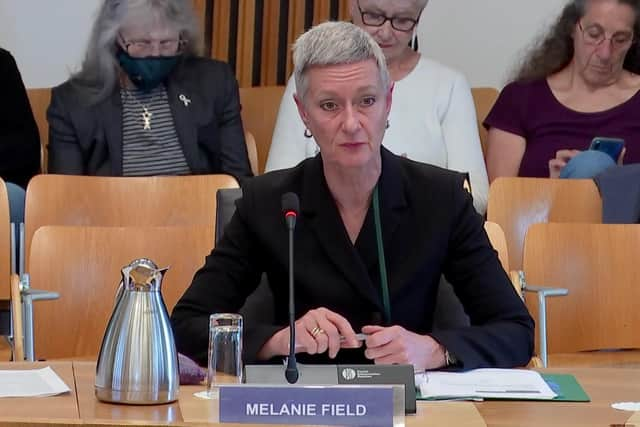Gender Recognition Scotland: EHRC says 'lack of certainty' remains over GRA reform despite delay concerns
The comments from the public body, which is responsible for the enforcement of equality and non-discrimination laws in England, Scotland and Wales, were made to the equalities, human rights and civil justice committee on Tuesday.
The committee heard evidence from trans rights groups and the EHRC on the Gender Recognition Reform (Scotland) Bill, which is being considered by Parliament.
Advertisement
Hide AdAdvertisement
Hide AdThe Bill, introduced to Holyrood in March, seeks to ‘streamline’ the process for a person to receive a gender recognition certificate by introducing new measures such as removing the requirement for a medical diagnosis.


However, the EHRC has said there are still questions around “practical consequences” of the reform, which has sparked outrage amongst gender critical groups.
Previously, the commission altered its position on amending the process for a person to change their legal sex after the Scottish Government consulted on the reform.
Speaking at the committee, Melanie Field, chief strategy and policy officer for the EHRC, said: “In the case of reform of the Gender Recognition Act, we reached the position that more detailed consideration is needed before legislative change is made.
"This is because of the continued lack of certainty about the practical consequences for individuals and society of extending the ability to change legal sex from a defined group with a recognised medical condition who have demonstrated their commitment and ability to live in their acquired gender to a wider group.
“Questions continue to be raised in different quarters about potential consequences. For example, in relation to the collection and use of data, participation and drug testing in competitive sport, measures to address barriers facing women and practices within the criminal justice system.”
However, charities and organisations such as the Scottish Trans Alliance, LGBT Youth Scotland and Stonewall Scotland voiced their concerns for further delaying the reform, citing the impact it has had on those within the trans community.
Vic Valentine, trans manager for the Scottish Trans Alliance, said the process of requiring medical reports was “intrusive and invasive”.
Advertisement
Hide AdAdvertisement
Hide AdThe Bill hopes to cut the time a trans person has to live in their acquired gender from two years to three months with an additional three-month reflection period.
Yet groups such as Trans Alliance, LGBT Youth Scotland and Stonewall Scotland agreed they found the time period “unnecessary”.
LGBT Youth Scotland’s Dr Mhairi Crawford suggested this period should be waived in circumstances such as when someone is approaching the end of their life.
Vic Valentine said: “It’s not necessary and it’s slowing up applications.
"Most trans people at the point where they are applying for legal gender recognition have done an inordinate amount of reflecting.”
Referring to debates amongst the public and published in the media around the GRA, the director of Stonewall Scotland, Colin Macfarlane, said discourse around proposed reforms was reminiscent of the treatment of gay men in decades past.
He also insisted the Bill as it had been proposed by the Government would not impact on the Equality Act 2010 – a key fear of opponents of the new legislation.
The 2010 Act allows for exceptions in protections for trans people, which can allow them to be barred from participating in women’s sports and accessing single sex services.
Advertisement
Hide AdAdvertisement
Hide AdDr Crawford said such claims the GRA would impact single sex spaces was “whipping up of moral panic”.
Mr Macfarlane, a gay man who came out in the late 1990s, added: “A lot of the discourse around this is reminiscent of the discourse around lesbian, gay and bi identities and particularly around gay men – that we were predatory, that we were somehow a threat to children, that we were a safeguarding risk, that there was something inherently dangerous about us.
“The same rhetoric is being used around trans people, and particularly trans women, around the reform of this Bill.”
When asked by Tory MSP Alexander Stewart if he believed the Bill posed a “threat” to women and girls and their rights, Mr Macfarlane said: “I think we have to be very careful in the public discourse around this that trans people are human beings. They are valid, they are not a threat to the wider public and some of the framing around this subject has been really unfortunate.”
Vic Valentine raised other concerns with the bill such as the reform having no provisions for non-binary people.
The reform would also allow applicants to be aged 16 and over, instead of the current 18 and over age of approval.
However, Dr Crawford said the “Bill doesn’t go far enough” with its inclusion of young people as she supports action to lower the age.
She said research LGBT Youth Scotland has conducted showed most trans people “come out” at age 15.
Advertisement
Hide AdAdvertisement
Hide AdConcerns were also raised during the session about a provision in the Bill that would allow an “interested person” to apply to a sheriff to have a gender recognition certificate revoked.
Mr Macfarlane said the provision could result in a family member of a trans person who does not support their transition to make a “vexatious” claim to have the certificate struck down, or even someone who did not feel trans people were “valid”.
Vic Valentine said they believed the Bill should limit those who can seek revocation to a civil partner or spouse of the applicant and the Registrar General.
Comments
Want to join the conversation? Please or to comment on this article.
